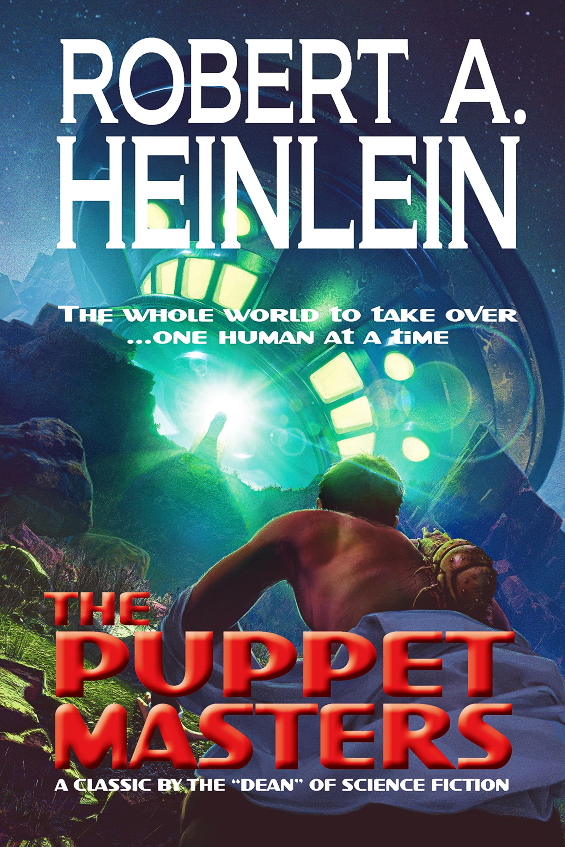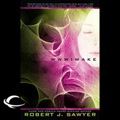
 The SFFaudio Podcast #363 – Jesse, Paul, and Marissa talk about The Puppet Masters by Robert A. Heinlein.
The SFFaudio Podcast #363 – Jesse, Paul, and Marissa talk about The Puppet Masters by Robert A. Heinlein.
Talked about on today’s show:
1951, the really annoying way Heinlein does things, Paul’s main Heinlein phase (in the late 1980s), when Paul was ten, Time Enough For Love, Expanded Universe, the basic parts of a Heinlein novel (in terms of characters), the Heinleinian triad, the young talented protagonist, the older wise crotchety man, and the red headed woman character, who The Man In The High Castle was, when Dick writes a novel…, when Heinlein writes a novel…, methamphetamine is 100% non-habit forming (?!), Jesse is uncomfortable with surety, Heinlein exudes surety from every pore of his body, orbital mechanics, what women want, Bruce Jenner’s gender switch, Heinlein’s politics, black people, women should be raised up in society, homophobia, Mary’s super-power is gaydar, homosexuality, asexuality, marriage, men and women are identical, “of course husband”, the alien is the husband, the structure, the final chapter, in case the mission to Titan fails, message in a bottle storytelling, first person perspective, surety undercuts it, has Dick ever written in first person?, Invasion Of The Body Snatchers, The Hanging Stranger, identical paranoia, how much he hates the Soviets, Heinlein was rabidly anti-communist, in the commissar’s office, WorldCon, God help us all, he was right but…, imagine if this novel is a metaphor for communism, the Second Red Scare, Soviet and Chinese communism, WWWII, Manhattan crater and Washington crater, projecting brawn, getting tanks to North America, the evil of the puppet master aliens, orgies on TV is bad, also gladiatorial combat, they kill cats!, no effect on Soviet Russia, hygiene, scabies and lice, parasitism, cranked up to 13, Saddam Hussein, U.S. politics, if it were re-written today…, core fears, 24 was that, looking at the structure, avenging the cats and dogs, a master of the craft, Luke Burrage, that is good writing, so different from Philip K. Dick’s books, a straight line vs. how did I get here, all the sins that Time Enough For Love, naked people standing around in cushioned apartments talking about legal matters regarding the decanting of babies while a cat walks into the room, get passed the cat, Pirate the cat, casual nudity, Eric S. Rabkin, making it absolutely necessary that the society go nudist (and never go back), Hyperpilosity by L. Sprague de Camp, combs, even in Heinlein’s kids books, in their dome homes the heat is cranked up, was Heinlein a nudist?, Hollywood, downhill after The Moon Is A Harsh Mistress, I Will Fear No Evil, an old white guy living in the body of a young black woman, the US Navy, hate and love for the military, this weird guy from Missouri writes his consciousness into his books, Job: A Comedy Of Justice, Friday, rape, when Heinlein talks about rape…, an artificial person, an inferiority complex, a fascinating society, the movie of The Puppet Masters, the fun stuff, the cat, the alien was kissing, being devoured by a woman, Eric Thal opens his mouth whenever possible, Sam, Mary, why does everyone hate this movie so much, Donald Sutherland, Keith David is always fun, unlike every X-Files this was competent, yeah look it’s a fake, the slugs are really smart, were they smart?, the sequence where Sam first gets a slug on his back is one of the best bits of Science Fiction, its almost as if he doesn’t know, more insidious and more scary, tying it all together, helicopter vs. skycar, Heinlein loves incest, they do juice you up, the addiction metaphor, had Dick developed it…, an Olympic athlete, what’s undercooked, who is in charge of their own minds, choices under some conditions but not under others, if we all had slugs on our backs…, getting married to Mary, love of a good woman ends addiction, black and white, Joe Cinidella is actually Italian until he becomes a Nazi, a flipped switch, turning on the waterworks, operating as a slug, Glory Road, set in fairlyand, Nebraska, all about the contract, an ambivalent relationship with marriage and law, The Moon Is A Harsh Mistress, alpha husbands and beta wives, primae noctis, you get into their psychology, really weird people, WWII and methamphetamines, go pills, tempus fugit, chasing the cat, is Heinlein challenging us?, Star Trek: Operation: Annihilate (aka Planet of the Pancakes), Maissa Bessada, resetting the show at the end of the episode, another point of Vulcan physiology, Kirk’s brother is named “Sam”, Mary is the vessel for world piece, Heinlein sued the makers of The Brain Eaters, Star Trek: The Next Generation, there’s no money until the Ferengi show up, Gene Roddenberry’s philosophy of the post scarcity economy, maybe women did act that way in the 1950s, a sequel in which Mary is saved from her marriage, 1980s tropes, sex scenes, Mission Impossible movies, developing out of taboos, the PG-13 effect, “they’re boffing, ok”, Alien, giant penis monster, Aliens, James Cameron’s problems with Harlan Ellison and The Terminator, The Outer Limits, The Brain Eaters, lifting things out of literary SF, Avatar is very good lifting, redoes the the first movie and the first, Luc Besson, The Professional, adding a baby doesn’t make things better, Ellen Ripley, the corporate military mission, Newt (from Aliens) is Mary (from The Puppet Masters), garbage bunk vs. good orbital mechanics, feral child, the structure is the same, spacesuit -> fighting suit, ejecting from the ship -> ejecting from the planet, a powerful story, Alien 3, Paul fulminates, the nine day fever (Venusian Jungle Fever), encephalitis, The Puppet Masters is a retelling of H.G. Wells’ The War Of The Worlds, here’s how I would do it, H.G. Wells was a cynical asshole, monstrous, liars, jerks, and racists, our CIA operatives know what they’re doing, the NSA, “you just killed a guy for no reason”, it isn’t uncaring wisdom that save humanity it’s man’s ingenuity, root em out and kill em all, it’s the end of Starship Troopers, the Elves of Titan, Independence Day aliens, Welcome to Earth scene, Have Space Suit, Will Travel, Willy Wonka-style, a space alien cop (the Mother Thing), “who lives like that?”, if Heinlein had had a kid, the serial was slightly rewritten by Horace Gold, the unexpurgated version, 1980s movie style, a hook-up with an anonymous blonde from a bar, the trope for James Bond, Virginia Heinlein, Stranger In A Strange Land, it is not better, weird names, Biblical names, Mary’s real name, Sam’s real name is Elihu, in the Book of Job, Elihu’s big speech
Elihu states that suffering may be decreed for the righteous as a protection against greater sin, for moral betterment and warning, and to elicit greater trust and dependence on a merciful, compassionate God in the midst of adversity.
putting us on the right path, x is so bad that we have to put all our trust in…., our precious bodily fluids, if Heinlein were alive today…, Ray Bradbury, the NSA, anarchism, Mary’s backstory, the Whitmanites, an explicit mention of the Doukhobors, Heinlein just likes nudity, Heinlein likes his women to older or a lot younger, physically young but actually older, a young secretary with an old man’s brain, The Cat Who Walked Through Walls, lots of surgeries or whatever, shrugging it off, a different experience than back in the day, you must read ancient authors, for another podcast, you don’t know SFF if you don’t read…, shame at not reading The War Of The Worlds, can you find Heinlein books at new bookstores?, Alfred Bester is great but he wrote two books, genre defining or pioneering, well-written idea SF, almost no science, a bit of politics, marriage, you don’t know SFF if you havent read a Heinlein novel, a long discussion for another time.




















Posted by Jesse Willis

 The SFFaudio Podcast #601 – An Exchange Of Souls by Barry Pain, read by Roger Melin
The SFFaudio Podcast #601 – An Exchange Of Souls by Barry Pain, read by Roger Melin























 WWW: Wake
WWW: Wake